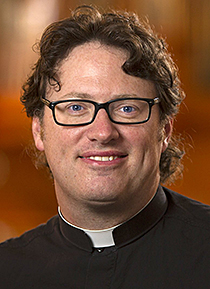
Faith
. . . Exactly the moment Judas begins to act upon the betrayal wickedly burning in his heart, at that precise moment, Jesus says, "Now is the Son of man glorified, and God is glorified in him." How strange is that?

Whitfield
Acts 14:21-27
Ps 145:8-9, 10-11, 12-13
Rv 21:1-5a
Jn 13:31-33a, 34-35
In this Sunday's Gospel reading, we are brought back to Holy Thursday, to that dark evening of gift and betrayal and a new covenant. We are being asked to reconsider the Lord's words, his "new commandment" to love, but now in Easter light. The church wants us to reconsider these words of the Lord.
Because now, perhaps, we can better understand just what Jesus meant talking about glory on that dark evening just a few weeks ago, on the night of his arrest, just before his crucifixion. I mean, in the moment when he said what he said, it must have sounded odd. It must have made very little sense at the time.
Think about it: the very moment Judas walks out the door, exactly the moment Judas begins to act upon the betrayal wickedly burning in his heart, at that precise moment, Jesus says, "Now is the Son of man glorified, and God is glorified in him." How strange is that?
At that moment, you see, talking about glorification makes no sense. From an earthly perspective, glory is the last thing you'd call it. Most people would call it betrayal, call it an injustice. They would call it what it is: evil. But Jesus instead talks about glory. "Now is the Son of man glorified . . . God will glorify him at once" (Jn 13:31-32). Why did he say those words in that moment? Why did he strangely talk about glory in the face of such evil?
Now, in Easter light, we know. Now we may reconsider these words in light of the resurrection, in light of the fact of God's victory in Christ, in light of the fact of Christ's ascension, that he is seated at the right hand of the Father, that every knee shall bow, that God, by this triumph, will "make all things new" (Phil 2:10; Rv 21:5). Now we reconsider these words by the light of Easter faith and joy. Now we understand that Jesus, when talking about glory, was looking beyond betrayal and injustice to love and sacrifice and beyond death to resurrection.
That's why Jesus talked about glory that dark evening. Because he knew when love and trust in the Father met with betrayal, injustice, and evil, that the result would be sacrifice and resurrection. He knew that love would, in fact, have the last word. And he himself is that word. This is what goodness says to evil: that whatever evil means to do, what God means to do matters more.
And so, the one who gives his will completely to the Father can talk about glory as Judas walks out the door, as odd as that may seem. Because evil is already powerless against the Son one with the Father, powerless against the Son who prays, "not my will, but yours be done" (Lk 22:42). Jesus talked about glory because he knew what love would do.
Which is why he commands us to love. We are the ones Jesus taught to pray daily "Thy will be done." We are the ones called to follow Christ, called to face the betrayals, injustices and evil in our own lives just as he did, strangely talking about glory while evil does its wicked whatever.
"As I have loved you, so you also should love one another" (Jn 13:34). We are to hold each other up in love, sacrifice ourselves for each other, help each other to face each other's own sacrifices. We are to be a church of disciples who are ready to become martyrs, each willing to face evil as sacrificially as Jesus did while oddly calling it glory just as he did.
Such is how Easter should change us. Knowing that death is now not the end, that it is stingless, that resurrection in Christ is what awaits us, that God's heaven is our destiny and not whatever evil tries to achieve; knowing all that in faith, now we can take on the world's evil disabused of the notion that we must become evil ourselves in order to fight it, but that we need only to lay down our lives in love as Christ did, talking about glory in the darkness like him.
Because we know that the Father raises such from the tomb, those who have become like Christ. Which is what we have indeed become since that first Easter long ago, since Jesus first talked about glory as Judas walked out the door.
- Father Joshua J. Whitfield is pastor of St. Rita Catholic Community in Dallas and author of "The Crisis of Bad Preaching."
Recent articles in the Faith & Family section
-
Scripture Reflection for May 18, 2025, Fifth Sunday of EasterFather Joshua J. Whitfield
-
Does a married person need their marriage blessed or 'convalidated' once they become Catholic?Jenna Marie Cooper
-
All eyes on RomeJaymie Stuart Wolfe
-
On the Camino: Many CaminosMark T. Valley
-
Pedestal deserved: Carlo Acutis' digital authenticitySister Hosea Rupprecht, FSP























